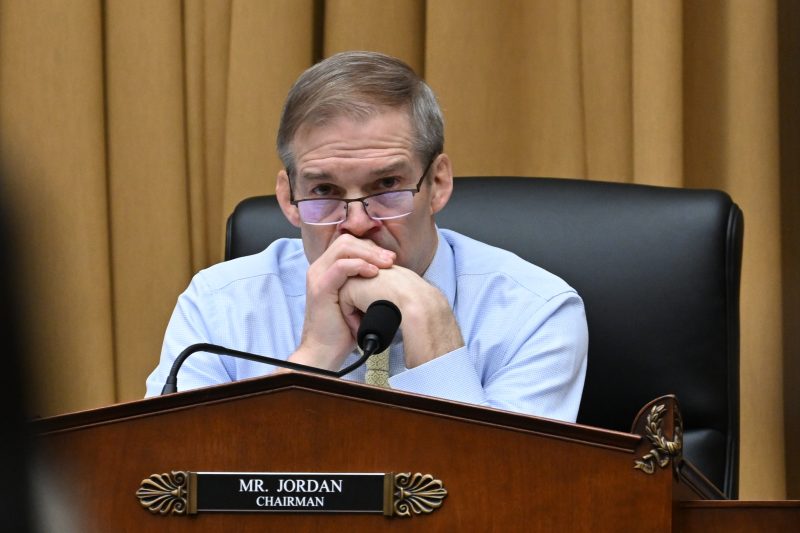The Republican-led House Judiciary Committee and the Justice Department dialed back tensions this week after Chairman Jim Jordan (R-Ohio) agreed not to videotape a transcribed interview with a mid-level FBI employee, according to people familiar with the matter who spoke on the condition of anonymity to discuss the sensitive situation.
The FBI employee was the first witness to appear before the committee who was not videotaped after Justice Department officials on Monday threatened to cancel the witnesses appearance if Jordan did not agree to the bureau’s terms of a transcribed interview only, according to people familiar with the discussions.
Jordan, who chairs the subcommittee investigating the alleged weaponization of the federal government, has requested transcribed interviews from over a dozen current and former FBI employees as part of the committee’s search for bias against conservatives in the federal government. The behind-the-scenes negotiations over videotaping witnesses have become a flash point in the weaponization subcommittee’s strategy, as Justice Department officials have drawn a red line at being filmed during closed-door proceedings.
“The Department is committed to working with Congress to respond to legitimate oversight requests,” a spokeswoman for the Justice Department said in a statement. “So far this Congress, the Department has made employees available for briefings, interviews, and hearings, and has provided tens of thousands of pages of documents in response to the Judiciary Committee’s requests.”
“The Department’s longstanding policy, in place across administrations and accepted across Congresses, has been to make employees available for interviews transcribed in writing to meet Congress’s informational needs. The Department, including the FBI, has and will continue to work diligently to accommodate the Committee’s requests,” the spokeswoman added, without directly addressing the issue of videotaping employees.
It’s unclear what the committee plans to do with the video recordings of closed-door interviews or whether it will continue to videotape witnesses. But Democratic lawmakers and Justice Department officials have privately expressed concerns about potential harassment against those whom Jordan has publicly identified or subpoenaed.
Some on Jordan’s team pointed to a videotaped deposition provided by Elvis Chan, a supervisory agent for the FBI who testified as part of a lawsuit against the Biden administration about alleged attempts to censor conservative voices on social media, as precedent for the committee’s recordings. However, Chan’s appearance was a deposition in a court case overseen by a judge, while witness appearances by government employees before Congress always involve a negotiation with the administration.
Jordan’s team also has not provided the Justice Department with an informational need for videos, nor a reason for departing from long-standing practice, according to a person familiar with the matter who, like others who spoke to The Washington Post, did so on the condition of anonymity to discuss internal conversations. Russell Dye, a spokesperson for Jordan, declined to comment on how the videos will be used.
Issues with the subcommittee’s process have been raised by at least one former government employee who appeared before the panel earlier this year. That complaint has contributed to the deepening distrust between the committee and the Justice Department, according to people involved.
A lawyer for Jill Sanborn, the former assistant director of the FBI’s national security branch, sent a letter to lawyers for the Judiciary Committee and the FBI earlier this month that raised concerns about apparent technical glitches in the video recording of Sanborn’s appearance in February.
Sanborn’s lawyer, Carter Burwell, who reviewed the video with Republican counsel for the committee, noted that two sections of Sanborn’s interview “are missing from the recording entirely,” according to a copy of the letter obtained by The Post.
“We note that one of the missing sections, comprising the first 13 pages of the transcript, includes your explanation of the interview’s ground rules,” Burwell wrote. “In light of the technical glitches we identified and, most importantly, the failure to record the applicable rules for the interview, we respectfully ask that Chairman Jordan agree to discard the video and use the written transcript as the only record.”
Dye said in a statement that Sanborn could appear before the committee again to retape her interview if she wished. He did not address Burwell’s request to strike the video from the record.
“The minor technical issues on the video recording of Ms. Sanborn’s interview had no bearing the substance of the interview,” Dye said. “If Ms. Sanborn insists, however, we are happy to have her back in before the Committee.”
Democrats on the committee have had access to transcripts of interviews Jordan has conducted, but they have been denied access to videotapes of the interviews, according to people involved with the investigation.
A spokesperson for Democrats on the Judiciary Committee declined to comment.
The practice of using prerecorded clips of witness interviews to present findings to the public was popularized by the House select committee investigating the Jan. 6, 2021, attack on the U.S. Capitol. Those clips were then edited together to create a series of documentary-style reports, strategically played during the committee’s public hearings.
The practice has introduced a new layer of negotiations between committees and witnesses, as congressional committees have historically rarely recorded depositions.
However, current government staffers who appeared before Jan. 6 committee investigators did not provide videotaped transcribed interviews, and those who did appear on camera were former staff members who did not fall under the Justice Department’s policy and negotiated the terms of their appearances themselves.
Jordan has faced some scrutiny over his handling of the marquee subcommittee that has been charged with leading the probe into some of Republicans’ biggest targets in the federal government. While his peers on the panel have defended his work thus far, some on the right have criticized Jordan for being slow to beef up the subcommittee’s staff and insufficiently aggressive in issuing subpoenas for interviews and testimony. Democrats, and even some Republicans, also have criticized Jordan for a lack of substantive findings.
Jordan on Monday hosted a field hearing in New York, styled to cover “Victims of Violent Crime in Manhattan.” In practice, the hearing was largely a salvo in the GOP’s battle against Manhattan District Attorney Alvin Bragg, the prosecutor pressing charges against former president Donald Trump related to hush money payments. Bragg has sued Jordan over what he called a “brazen and unconstitutional attack” on his office.








